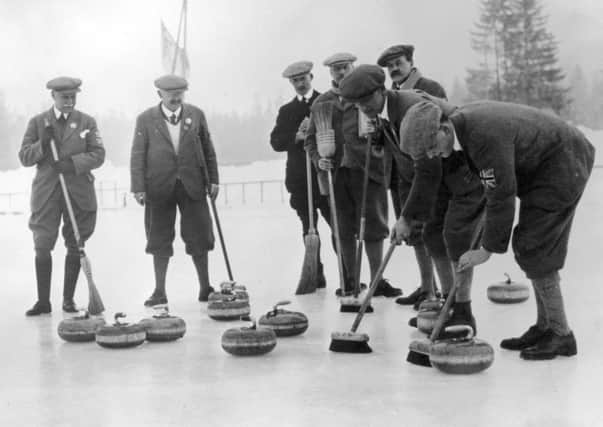Scotland's 1924 Olympic curling team were golden generation


That honour belongs to the team in the inaugural event in 1924 in Chamonix, consisting of Scots Willie and Laurence Jackson, Tom Murray and Robin Welsh. Even if the feat is repeated by Smith’s rink at these Games, there’s one record created by Welsh that will still be beyond their reach – aged 54 and 101 days when he struck gold, Welsh remains the oldest gold medallist in Winter Olympic history. Nor is it likely any will emulate the Watsonian’s sporting pedigree of being an internationalist at rugby and tennis as well as curling.
What makes the tale of the 1924 success fascinating is that for years it was thought that curling was then a demonstration sport and not official. A consequence of that was that the four medallists died without realising they were true Olympic champions.
Advertisement
Hide AdAdvertisement
Hide AdThe background was that after 1924, curling was a demonstration sport at the Winter Games till accorded full competitive status for the Nagano Games in 1998, leading to the assumption that in Chamonix it was also demonstration only. In 2006 scrutiny of the records prompted by sports historians, including Scot Doug Gillon, convinced the Olympic authorities that in 1924 it had indeed been a full competitive event for which medals and an accompanying diploma had been awarded and the Scots’ true status was officially recognised.
The misunderstanding arose partly from the fact the 1924 Games took place under “International Winter Sports Week” banner. This reflected the ongoing debate among the Olympic authorities on whether to establish a Winter Olympics given the opposition from Nordic Games countries, the principal winter sports proponents. The following year at the International Olympic Congress in Prague, the decision to create Winter Games was ratified, with the 1924 Chamonix event being retrospectively designated the first Winter Olympics.
The successful 1924 team all had agricultural backgrounds. Tom Murray and father and son Willie and Laurie Jackson farmed in Lanarkshire, while Welsh did so at Liberton Mains, then on the outskirts of Edinburgh. All had excellent CVs, with skip Willie Jackson considered the pre-eminent Scottish curler of the first half of the 20th century. They had won the prestigious Manchester Ice Palace Shield together in 1922, while Welsh had skipped a Scottish team to three wins against the Canadians for the Strathcona Cup. At that time, selection lay in the hands of the Royal Caledonian Curling Club and it was no surprise when they were chosen to represent Britain in Chamonix, with each player having to make a contribution to his own expenses.
Three days before the opening ceremony on 25 January, a Curling Congress was held in Chamonix’s Hotel Majestic to discuss details of the forthcoming competition, where it was decided games would be of 18 ends in round-robin format. Three other teams were due to take part, Switzerland, France and Sweden, but Switzerland withdrew before the opening ceremony, where the Scots marched behind the municipal band, brooms held against their shoulders and curling stone handles hung round their necks on tartan ribbons. In contrast to today’s apparel, the players then took to the ice wearing plus fours, collar and tie and bunnets, while their jackets sported a Union Jack flag patch on one arm.
On 29 and 30 January, the Scots quartet comfortably defeated Sweden and France respectively to claim the inaugural title despite reservations about the quality of the ice. Later at the Royal Caledonian Club’s agm, it was recorded that “the ice was not good, far short of the ideal ice at Haymarket Ice Rink…” After Chamonix, the winning team members continued at the forefront of the sport with Welsh, at the age of 63, captaining Scotland against England in 1932.
Welsh was a remarkable sportsman from a remarkable sporting family. His first love was rugby. Playing on the wing for Watsonians from 1890 to 1898, he was a member of their multiple championship-winning teams in that period, captaining one successful side. He won four caps for Scotland, three in the Triple Crown-winning side of 1895 and was described in contemporary reports as “lithe and speedy as a greyhound.” Later he ran the touchline when Scotland clinched its first Grand Slam in 1925 and became president of the SRU.
Once he retired from playing rugby, Welsh turned his attention to tennis, at which he also excelled. Twice winner of the East of Scotland championship and finalist several times, he represented Scotland in 1914, aged 45, against Ireland. He also found time to make a significant contribution to Edinburgh’s civic life as town councillor, magistrate and bailie.
His wife, Mollie, was an outstanding tennis player, six times Scottish champion and an accomplished curler. In a short but brilliant athletics career, his brother, Hugh, was twice British mile champion and won numerous Scottish titles. Their cousin, WH Welsh, known as Willie, was a dual Scottish rugby and athletics internationalist, once memorably winning the Scottish 100, 220 and 440 yards titles in one afternoon. Robin’s son, also Robin, was a noted rugby and tennis player and curler, later secretary of the RCCC and the International Curling Federation.
Advertisement
Hide AdAdvertisement
Hide AdCurling’s inclusion in the 1924 Winter Olympics was a landmark. Given all that has since transpired in terms of doping and other scandals at the Olympics, it is salutary to consider Baron de Coubertin’s words at the Chamonix closing ceremony, “Winter sports have a certain purity about them, that is why I’m inclined to support and nurture them in the Olympic environment.”
l Jack Davidson wishes to thank the late sports reporter Robin Morris for his help with this piece.